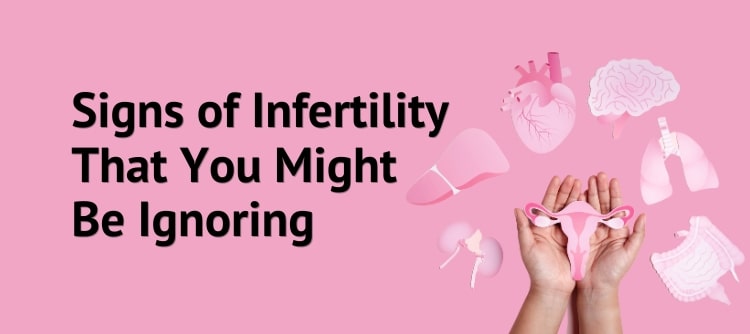Signs of Infertility That You Might Be Ignoring

Infertility is a sensitive topic that affects many individuals and couples around the world. Understanding the causes and recognizing the signs of infertility is crucial for those trying to conceive. In this blog post, we’ll delve into the root causes of infertility and shed light on common signs that women might unknowingly be ignoring.
What is Infertility
Infertility is described as the inability to conceive following a year of unprotected intercourse on a regular basis. It can result from various factors such as hormonal imbalances, structural abnormalities, or reproductive health issues in either partner. Lifestyle factors like stress and age can also contribute. Seeking timely medical intervention, fertility treatments, or assisted reproductive technologies may enhance the chances of conception. Nurturing a supportive environment and maintaining overall well-being are crucial in addressing infertility challenges.
Causes of Infertility
1. Age: As women age, their fertility naturally decreases. Fertility peaks in the early 20s and starts declining in the late 20s to early 30s. After 35, the decline becomes steeper, making it more challenging to conceive.
2. Irregular Menstrual Cycles: Regular menstrual cycles are often indicative of a healthy reproductive system. Irregularities in the menstrual cycle, such as unusually short or long cycles, can be a sign of hormonal imbalances affecting fertility.
3. Polycystic Ovary Syndrome (PCOS): PCOS is a prevalent hormonal condition that affects women of reproductive age. It can lead to irregular periods, anovulation (lack of ovulation), and cysts on the ovaries, all of which contribute to fertility issues.
4. Endometriosis: Endometriosis occurs when tissue similar to the lining of the uterus grows outside the uterus. This condition can cause pelvic pain, inflammation, and scarring, leading to fertility challenges.
5. Uterine Issues: Structural issues with the uterus, such as fibroids or polyps, can interfere with implantation and hinder successful pregnancies.
6. Sexually Transmitted Infections (STIs): Certain STIs, if left untreated, can cause damage to the reproductive organs, leading to infertility.
Common Signs of Infertility in Women
1. Painful Menstruation: Severe menstrual cramps or pelvic pain can be a sign of underlying issues like endometriosis or pelvic inflammatory disease (PID), affecting fertility.
2. Changes in Menstrual Bleeding: Unusually heavy or light menstrual bleeding, or spotting between periods, could signal hormonal imbalances impacting fertility.
3. Hormonal Imbalances: Irregularities in hormonal levels, as evidenced by symptoms like excessive hair growth, acne, or sudden weight changes, may affect ovulation and fertility.
4. Painful Intercourse: Pain or discomfort during intercourse can be indicative of conditions such as endometriosis or pelvic adhesions, potentially impacting fertility.
5. Recurrent Miscarriages: Experiencing multiple miscarriages may be a sign of underlying fertility issues, warranting further investigation.
Common Signs of Infertility in Men
One of the early indicators of male infertility is changes in sexual function. This may include difficulty achieving or maintaining an erection, premature ejaculation, or a decrease in libido. These changes can be linked to hormonal imbalances or underlying health issues affecting fertility.
1. Abnormal Semen Analysis: A crucial aspect of male fertility assessment is a semen analysis. An abnormal semen analysis, indicating low sperm count, poor sperm motility, or abnormal sperm morphology, can be a red flag for infertility issues.
2. Testicular Pain or Swelling: Persistent pain or swelling in the testicles may signify underlying conditions such as varicoceles (enlarged veins in the scrotum) or infections that can impact sperm production and quality.
3. Recurrent Respiratory Infections: Surprisingly, recurrent respiratory infections, especially those affecting the respiratory tract, can be associated with fertility issues in men. Elevated body temperature from infections may temporarily hinder sperm production.
4. Exposure to Environmental Toxins: Occupational or environmental exposure to toxins, such as pesticides, heavy metals, or radiation, can adversely affect sperm production and quality, contributing to infertility.
Signs of Hormonal Imbalance That May Indicate Infertility
1. Irregular Menstrual Cycles: For women, irregular menstrual cycles can be a sign of hormonal imbalance. Fluctuations in estrogen and progesterone levels may disrupt ovulation and impact fertility.
2. Unexplained Weight Changes: Sudden weight gain or loss can disrupt hormonal balance, affecting reproductive functions. Hormonal imbalances related to weight changes can impact menstrual cycles in women and sperm production in men.
3. Skin and Hair Changes: Skin issues like acne or excessive hair growth in women (hirsutism) and hair loss in men may signal hormonal imbalances, potentially affecting fertility.
4. Mood Swings and Fatigue: Hormonal fluctuations can influence mood and energy levels. Persistent mood swings, irritability, or unexplained fatigue may indicate hormonal imbalances that affect fertility.
5. Temperature Regulation Issues: Hormonal imbalances can impact the body’s ability to regulate temperature. For men, elevated scrotal temperature due to hormonal issues may affect sperm production.
Medical Tests for Diagnosing Infertility
1. Ovulation Monitoring: For women, monitoring ovulation is a fundamental step. This can be done through various methods, including tracking basal body temperature, using ovulation predictor kits, or undergoing hormonal assessments to ensure regular and healthy ovulation.
2. Semen Analysis: Semen analysis is a cornerstone in evaluating male fertility. It evaluates sperm quantity, quality, and motility. Abnormalities in these parameters can provide insights into potential male reproductive issues.
3. Hormonal Testing: Hormonal imbalances can significantly impact fertility. Blood tests to evaluate hormone levels, such as follicle-stimulating hormone (FSH), luteinizing hormone (LH), estradiol, and thyroid hormones, help identify irregularities that may affect reproductive function.
4. Hysterosalpingography (HSG): HSG is a radiologic procedure used to examine the uterus and fallopian tubes. It involves injecting a contrast dye into the uterus and taking X-rays to identify any structural abnormalities or blockages that may hinder conception.
5. Pelvic Ultrasound: A pelvic ultrasound is a non-invasive imaging test that allows the examination of the reproductive organs. It helps identify conditions such as polycystic ovary syndrome (PCOS), uterine fibroids, or ovarian cysts that may contribute to infertility.
6. Genetic Testing: Genetic testing may be recommended to identify any hereditary factors contributing to infertility. This is especially relevant if there is a family history of reproductive issues or recurrent miscarriages.
7. Hysteroscopy and Laparoscopy: These minimally invasive procedures involve inserting a thin, lighted tube into the uterus (hysteroscopy) or the abdomen (laparoscopy) to directly visualize and diagnose issues such as uterine abnormalities, endometriosis, or blocked fallopian tubes.
Treatment Options for Infertility
Once a diagnosis is established, various treatment options can be explored to address infertility and enhance the chances of conception.
1. Lifestyle Modifications: Living a healthy lifestyle can have a beneficial effect on conception. This includes maintaining a balanced diet, regular exercise, managing stress, avoiding excessive alcohol consumption, and quitting smoking.
2. Medication: Fertility medications may be prescribed to regulate ovulation, stimulate egg production, or enhance sperm production. Common medications include clomiphene citrate, gonadotropins, and letrozole.
3. Intrauterine Insemination (IUI): IUI involves placing specially prepared sperm directly into the uterus during ovulation, increasing the chances of sperm reaching and fertilizing the egg.
4. In Vitro Fertilization (IVF): Assisted reproductive technologies like IVF are commonly utilized. It involves fertilizing an egg with sperm outside the body and implanting the resulting embryo into the uterus. IVF is effective for various infertility causes, including blocked fallopian tubes, male factor infertility, and unexplained infertility.
5. Surgery: Surgical interventions may be recommended to address structural issues contributing to infertility. This could include procedures to remove uterine fibroids, correct abnormalities, or repair blocked fallopian tubes.
6. Egg or Sperm Donation: In cases of severe infertility, where the production of viable eggs or sperm is compromised, using donor eggs or sperm may be a viable option.
7. Surrogacy: Surrogacy involves a woman carrying and delivering a baby for another individual or couple. This option is considered when carrying a pregnancy to term is not possible for the intended parent(s).
Conclusion
While infertility may present challenges, it is also a field of medicine with continually evolving possibilities. The road to parenthood may have its twists and turns, but with awareness, proactive measures, and the right support, the journey to parenthood can find valuable support at the best IVF center in Jaipur. Remember, you’re not alone in this journey, and with each step forward, you’re moving closer to the possibility of welcoming new life into your family.
